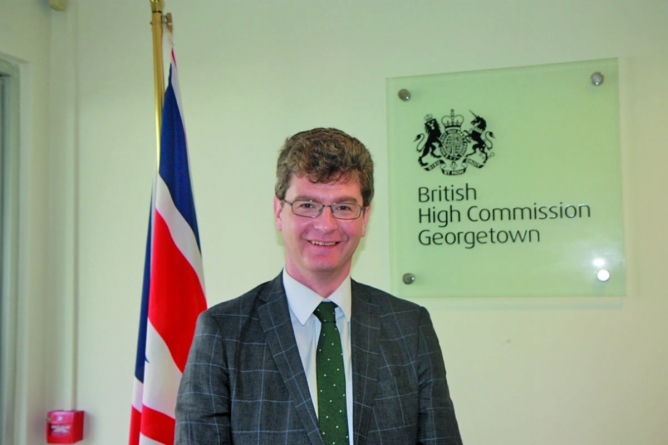Constitutional Reform should be high on agenda after final declaration
British High Commissioner to Guyana, Greg Quinn, is hopeful that constitutional reform will be high on the agenda for Guyana after credible election results would have been declared and an administration is sworn in.
During a recent interview with Kaieteur Radio, Quinn highlighted that constitutional reform is paramount to providing the overarching legal framework, which sets out the basis of the social contract between a state and its people, affecting all aspects of policy and society. “They establish the institutions of government,” Quinn said, “and their powers vis-à-vis (with regard to) each other and with and between the people.”
In stressing the importance of constitutional reform, the High Commissioner spoke of his homeland, Northern Ireland – a religious society that was divided for decades. For the greater good of the country, the two main leaders of the political divide, Ian Paisley and Martin McGuiness, agreed that there needed to be a new way of governing the land. They opted for constitutional reform.
“These two guys, two very diametrically- opposed people—Ian Paisley and Martin McGuiness—as far apart as you can find, decided that they had to come together for the greater good of the country, and that’s how we ended up with the Good Friday Agreement in 1996.”
By signing that agreement the two leaders ended terrorism, said Quinn. This he said was complemented by a boom in the economy soon after and citizens of the country thrived. “There was a changed way of life in Northern Ireland that I didn’t think that I would ever see in my lifetime,” Quinn expressed.
“We need to now think of going forward after getting through this election process, and work to the benefit of every single member of society,” he appealed.
Both of the major political parties, the People’s Progressive Party/ Civic (PPP/C) and the A Partnership For National Unity + Alliance For Change (APNU+AFC) have for years peddled a rhetoric of undertaking constitutional reform, as recorded in the recent and past manifestos of both parties.
One key objective of the APNU+AFC manifesto of 2015 highlighted that, “Undertaking constitutional reform to remove the scope for abuses and excesses carried out with impunity by the Executive and by the President, in particular. Part of the solution lies in reform of the National Assembly to ensure checks on the majority in the Legislature and on the Executive so that the interests of the nation as a whole and the interests of substantial minorities are taken into account…” It added too that “Constitutional, electoral and parliamentary reforms are imperative.”
After gaining victory and assuming office in 2015, the coalition, pursuant to Article 119(A) of the Constitution, appointed a Standing Committee for Constitutional Reform for the purpose of continually reviewing the effectiveness of the working of the Constitution and making periodic reports to the National Assembly, with proposals for reform as necessary. The Parliamentary Standing Committee for Constitutional Reform currently consists of seven members and is headed by Attorney General, Basil Williams. However, that committee met less than seven times in the past five years, as data shows.
Nonetheless, both the PPP/C and the governing coalition have promised to advance constitutional reform if given the opportunity to govern.






















